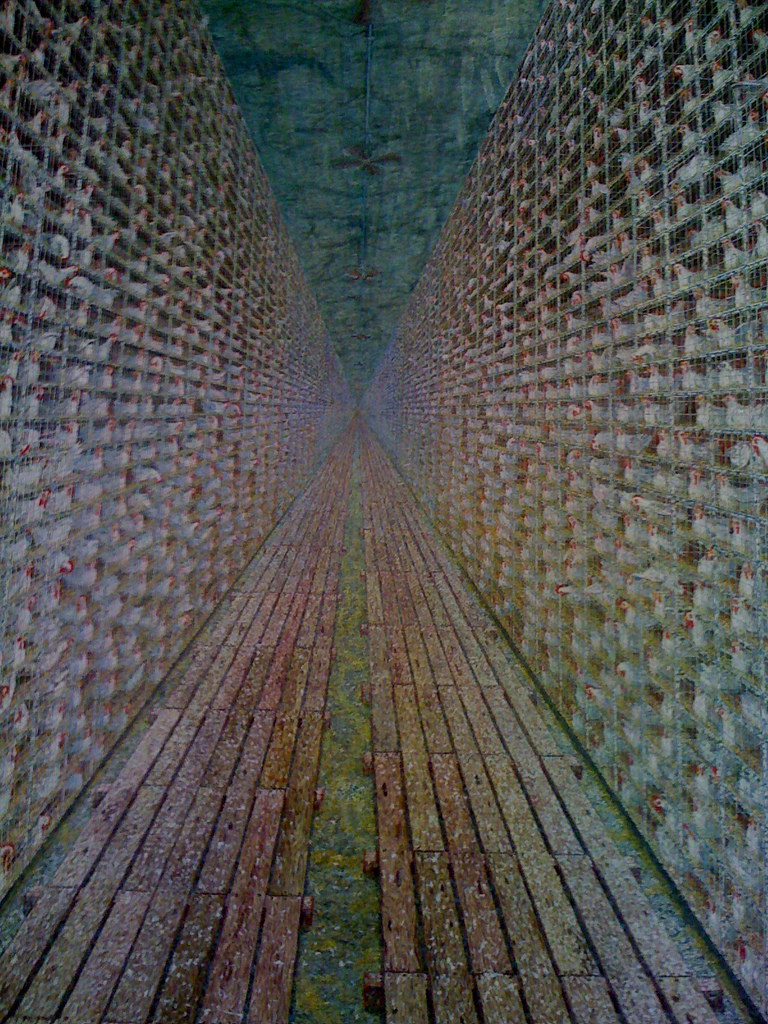“Factory farming, of course, does not cause all the world’s problems, but it is remarkable just how many of them intersect there.”1
-Jonathan Safran Foer.
Factory farming is an industrial system for intensive agriculture that breeds massive amounts of animals in compacted spaces, at a reasonable price. Economist Herman E. Daly has already warned that this economic activity is not sustainable, and that society must recognize that human economies are a subsystem of larger ecosystems and must adapt to function within ecosystem constraints.2 The Centers for Disease Control and Prevention (CDC), have warned that three out of every four new or emerging disease in people come from animals.3 The ways these animals live later result in not only health hazards, but also environmental hazards by releasing toxic gases and chemicals into the environment. Factory farms are one of the world’s largest contributors to global warming and many other environmental damages.4 The benefits of factory farming in the United States do not outweigh the costs society has to pay, such as environmental damages and health hazards.
Commercial livestock farming started in the late 1800s. The farming of animals began small-sized and the animals were able to roam on land, on actual farms. As the human population increased at a fast pace, by the 1920s, factory farming had become a way to produce more food to satiate demands and spend less money.5 But is this a good enough reason for large amounts of animals to be kept indoors and forced to accommodate themselves to unnatural habitats? In reality, your food is no longer from a farm; it is from a factory. The people that run these companies don’t want you to know where your food is from, because if you knew, you might not want to eat it. Animal meat consumption has become an increasing environmental and health issue in the United States, causing grave dilemmas. Its main influencer and provider to the meat industry is industrial agriculture, which is known for its enormous production of food. Thanks to advances in agricultural technology, factory farming has grown at an impressive rate in the last century. We are now engineering our food. These systems of intensive productions have accomplished producing large amounts of food, on small portions of land. Many people think that because they are animals, they do not need to be treated with any delicateness, but they are still living creatures exposed to extreme and poor circumstances. These industries have more and more tools to help the animals survive the poor conditions they are forced to live in. Animals are held in small cages, cramped together, restrained of their natural and basic needs. Chickens, for example, never see sunlight. They may take a few steps and then fall down because they can’t keep up with all the weight that they’re carrying.6 This is due to the use of hormones and antibiotics. But this problem is not just with chickens; its with all livestock.

The ways that animals live or simply exist are not only unethical but they are also a hazard to human health. Before using antibiotics, all the animals crammed together would have been subject to spreading disease easily. Now they are supplied with great amounts of antibiotics and vitamins in their food to prevent the spread of diseases and to stimulate their growth.7 Birds are now raised and slaughtered in half the time they were fifty years ago, and they are twice the size they used to be, being redesigned to have larger breasts. Almost half of all the antibiotics in the United States are used in factory farming.8 Animals who become resistant to the drugs supplemented can develop a bacteria that can be life-threatening if ingested by a human. The CDC has estimated that 20% of the antibiotic-resistant infections in the United States are traced back to germs that originate in farm animals.9 Animals can appear healthy even when they are carrying germs (zoonoses) that can make people sick. Zoonotic diseases are caused by viruses, bacteria, parasites, and fungi, ranging from mild to serious illness and even death depending on the zoonotic disease.10 Growth hormone usage on farm animals is an influential factor for consumers that subsequently come down with chronic diseases such as colon cancer, breast cancer, and prostate cancer.11 Just as the farm animals become resistant to the antibiotics, humans, when eating the processed food that are these animals, are exposed to exchanging genes and becoming resistant too.

Factory farms endanger the environment and its biodiversity. Livestock production produces 14.5 percent of all greenhouse gas emissions.12 They also use many fertilizers and pesticides, which release toxins like CO2, N2O, and CH4 that pollute the air.13 Deforestation has existed since the New World conquest, but the chemicals that are used today are the ones affecting the environment and everyone living in it. Much of deforestation is caused by converting forest land into crops to grow food for farm animals. By themselves, crops and livestock productions are not a bad thing; they are actually necessary. However, to do it at such a large scale creates problems. Factory farms are already strong contributors to climate change. By cutting down trees, less carbon dioxide is absorbed out of the atmosphere. Deforestation causes about 17% of the world’s greenhouse gas emissions.14 To make an animal or crop grow, you need large quantities of water as well, causing a water shortage. This causes environmental deterioration such as water pollution and biodiversity loss. If nothing is done, these damages will be the end of many natural habitats and species, and the damage will become irreversible.
It is estimated that in the United States, industrial agriculture accounts for more than five hundred million tons of animal waste per year.15 This over-accumulation of livestock waste releases major air contaminants that contribute to climate change. If the waste is not managed and ventilated correctly, the gases can become dangerous. As the excrement decays, these gases can cause toxic reactions that can even cause explosions. Factory farms generate excesses of excrement that cannot be fully absorbed into fields. The excess can also turn into an overflow that then enters our groundwater, and afterwards, into our drinking sources, generating water pollution that is not only an environmental problem, but also a health hazard. These contaminants may be disturbing to the nearby population, but they also contain bacteria and nitrates, which can cause illnesses and sometimes, death.

All of this contributes to climate change that not only affects humans worldwide, but all the planet’s animals and the ecosystems of the world. It is illogical that the main resource that allows agriculture to be possible, being nature itself, is in danger as a result of the wrong use humans have given it in livestock production. Natural resources are also essential in a country’s development. Besides them being crucial to the environment and its biodiversity, they fuel the agriculture systems. Without animal diversity, water, soil, and crops used to feed the farm animals, industrial farms cannot be maintained or exist at all. Many may prefer to buy conventional food due to its more affordable costs, but society pays a bigger price than just money when they buy these products. They condemn themselves to bigger problems. Yes, factory farms have become a solution to the unstoppable increase in food demands, but it is important that society makes a modification in their diet and buy more from local family farms. Organic farming combines methods that contribute to ecological balance, and help conserve biodiversity. Even though it may be more expensive, it’s about quality, not quantity. There are many reasons why factory farms are not the way to go, and the food has become much more dangerous in ways that are being deliberately hidden from us. Although the economic income and general satisfaction industrial farms generate in the United States and its people are important and influential to its development, it puts at an increasing risk many other factors that can be and will be catastrophic if nothing is done to reduce or regulate this massive production.
- Jonathan Safran Foer, Eating Animals (New York: Little, Brown and Company, November, 2009): 260. ↵
- “Industrial Animal Agriculture Must Transition to a More Sustainable System,” Factory Farming, ed. by Debra A. Miller (Detroit, MI: Greenhaven Press, 2010), https://link.gale.com/apps/doc/EJ3010701226/OVIC?u=azstatelibdev&sid=OVIC&xid=4936567a. ↵
- “Zoonotic Diseases | One Health | CDC,” Centers for Disease Control and Prevention, February 19, 2020, https://www.cdc.gov/onehealth/basics/zoonotic-diseases.html. ↵
- Humane Society International, “HSI Fact Sheet: The Impact of Animal Agriculture on the Environment and Climate Change in Brazil,” 2011, https://link.gale.com/apps/doc/EJ3010209287/OVIC?u=azstatelibdev&sid=OVIC&xid=bbf1df36. ↵
- Susan Aldridge, “Factory Farming,” in Food: In Context, ed. Brenda Wilmoth Lerner and K. Lee Lerner, no. 1 (Detroit, MI: Gale, 2011), 254–56. ↵
- Robert Kenner, Food, Inc., (Magnolia Home Entertainment, 2009): DVD. ↵
- Lynne Peeples, “Antibiotic Resistance Spreads Through Environment, Threatens Modern Medicine,” HuffPost (blog), May 9, 2012, https://www.huffpost.com/entry/antibiotic-resistance-environment-livestock_n_1502749. ↵
- Susan Aldridge, “Factory Farming,” in Food: In Context, ed. Brenda Wilmoth Lerner and K. Lee Lerner, no. 1 (Detroit, MI: Gale, 2011), 254–56. ↵
- “Factory Farming,” Gale Opposing Viewpoints Online Collection, (Farmington Hills, MI: Gale, 2018), https://link.gale.com/apps/doc/PC3010999252/OVIC?u=azstatelibdev&sid=OVIC&xid=e4a5d97e. ↵
- “Zoonotic Diseases | One Health | CDC,” Centers for Disease Control and Prevention, February 19, 2020, https://www.cdc.gov/onehealth/basics/zoonotic-diseases.html. ↵
- “Factory Farming,” Gale Opposing Viewpoints Online Collection, (Farmington Hills, MI: Gale, 2018), https://link.gale.com/apps/doc/PC3010999252/OVIC?u=azstatelibdev&sid=OVIC&xid=e4a5d97e. ↵
- Wenonah Hauter, “What Fossil Fuels and Factory Farms Have in Common,” YES! Magazine, May 30, 2018, https://www.yesmagazine.org/environment/2018/05/31/what-fossil-fuels-and-factory-farms-have-in-common. ↵
- Humane Society International, “HSI Fact Sheet: The Impact of Animal Agriculture on the Environment and Climate Change in Brazil,” 2011, https://link.gale.com/apps/doc/EJ3010209287/OVIC?u=azstatelibdev&sid=OVIC&xid=bbf1df36. ↵
- Humane Society International, “HSI Fact Sheet: The Impact of Animal Agriculture on the Environment and Climate Change in Brazil,” 2011, https://link.gale.com/apps/doc/EJ3010209287/OVIC?u=azstatelibdev&sid=OVIC&xid=bbf1df36. ↵
- “Factory Farming Is Not Cheap, Efficient, or Healthy,” Factory Farming, ed. Debra A. Miller, (Detroit, MI: Greenhaven Press, 2013), https://link.gale.com/apps/doc/EJ3010701238/OVIC?u=azstatelibdev&sid=OVIC&xid=0bb9373a. ↵




21 comments
Allison Grijalva
Hi Maria! I really enjoyed reading your article especially since I was not aware of the effects factory farms have on not only animals but different ecosystems around the world. I think it also provides an interesting dilemma in the grand scheme of things, because as you mentioned the industrial farms have answered the issue of increasing demands of food due to population. It is definitely a tricky question to answer as it does not look like one solution will answer all environmental questions and problems. Thank you for writing this article, great job!
Julia Aleman
The title and the image of this story really caught my eye and kept me reading. I’ve heard about foods that are processed through factories and the preservatives that can be very damaging to humans and what we eat. This topic is really important and addresses why people should lean more toward natural foods because this is can affect our overall health. This is a great article and I really enjoyed reading it.
Camila Garcia
This article is very important and extremely relevant. I knew little about factory farms, but after reading this article I feel informed. I feel as if factory farms were abolished it would help the fight against climate change not only is it inhumane to animals but it’s also inhumane against our earth. The author does a great job of explaining what a factory farm is and how it affects our planet.
Valeria Varela
I enjoyed your article a lot! It goes over a really important issue in the food industry. I believe there is a saying from Native Americans about how you should not take more than mother nature can replace and I think we’re so long gone from that. We are not only unethically harming animals but in the process we are contributing to another problem, climate change. This is a very powerful article.
Madeline Chandler
I have been educated on the issues with in the food industry and it is very disturbing. I think you kept detail consist through out this article and truly elaborated on the severity and urgency of the matter. I think more and more people are being educated about what is going into their body. The surprising thing to me is that you spoke about is that they are linking cancer to what people are eating and how the animals are kept. Thank you for expanding on an important topic.
Edward Cerna
This was such a great article and it caught my attention because I have done a project and research paper on this subject and although I knew a fair amount of information about this topic. I have The article still taught me a great deal about the subject such as the environmental effects of the factory farms. It is always hard to read about the inhumane practices that occur on the factory farms.
Aaron Sandoval
This article covered a very important topic, I know very little about factory farms, but after reading this article, I not only know more about them, but I want to learn more. This article was very informative and really detailed on what factory farms are, as well as their impact. I feel like I learned a lot after reading this article, learning about the atrocities that occur in these farms as well as their treatment of animals is really eye-opening.
Hailey Lechuga
This was a very informative article! As most people I know that we have developed cruel processes of extracting from the lives of animals to satisfy our own, but I never knew about the severity of the consequences of factory farms. Because it is such a contributor to climate change, it is urgent that we address this issue now before the damage becomes irreversible. We need to alter the way we produce, manufacture, and distribute goods to a more sustainable way. This article made me want to go vegan
Carlos Cortes
This is an issue that needs to be changes because we are hurting ourselves. Hopefully with the shift of more and more people looking out for their health and seeking healthier options like organic foods help fix this problem. Fixing this problem will not only create a better living conditions for the animals but healthier food and leave a smaller carbon footprint.
Faith Chapman
This reminds me of fast fashion, mainly because they have many similarities: fast fashion is also one of the biggest contributors to climate change, a lot of water and energy is used to sustain the industry, which has led to water and air pollution in the countries that process the raw material (usually these countries are developing countries), and there’s a lot of excessive waste generated in developed countries, often because of occurring waste during the clothes-making and the short lifespan of clothes themselves.